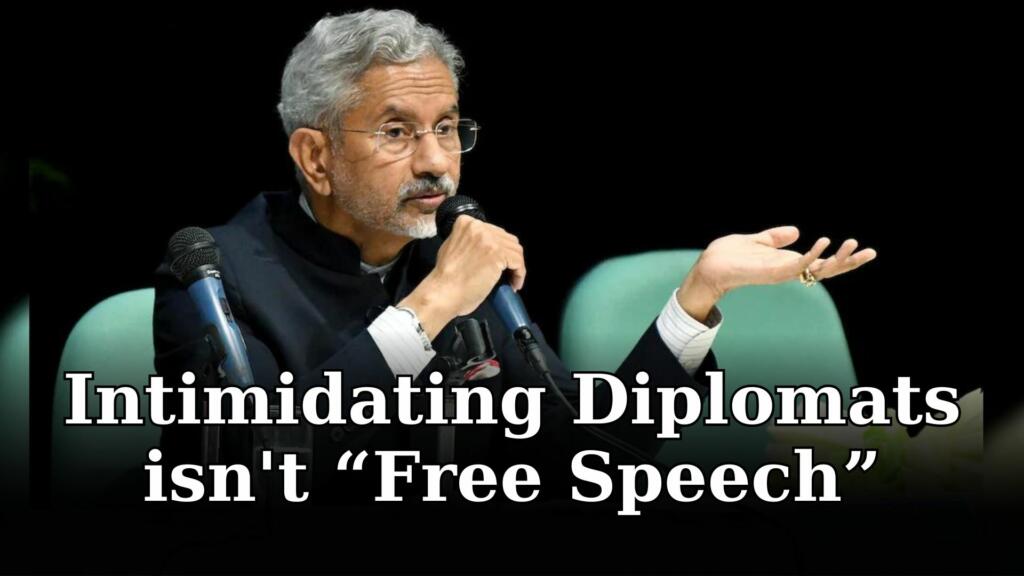India finds itself at a critical juncture in its foreign relations, grappling with multifaceted challenges ranging from rising Khalistani activism to escalating tensions along the Line of Actual Control (LAC) with China. External Affairs Minister S Jaishankar’s recent remarks shed light on India’s stance towards Khalistani activists and the evolving dynamics with China.
The Challenge of Khalistani Activism
Recent months have witnessed a resurgence in Khalistani activism, marked by incidents targeting Indian missions abroad. These include violent protests, arson attempts, and threats against diplomatic personnel. Such actions have raised concerns about the safety and security of Indian diplomatic premises and personnel.
India has called upon foreign authorities to take decisive action against Khalistani supporters involved in violent protests and acts of aggression. External Affairs Minister S Jaishankar emphasized India’s expectation for swift and appropriate measures to be taken against individuals advocating violence and separatism, stressing that such actions cannot be condoned under the guise of freedom of speech.
Implications on Diplomatic Relations
The resurgence of Khalistani activism has strained India’s diplomatic relations with countries such as Canada, the UK, the US, and Australia. Incidents like violent protests outside Indian diplomatic missions and attempts to damage property have necessitated robust responses from host nations. Failure to address these challenges effectively could undermine diplomatic ties and erode mutual trust between India and its international partners.
Balancing Freedom of Speech and Diplomatic Security
The challenge lies in striking a delicate balance between upholding the principles of freedom of speech and ensuring the safety and security of diplomatic premises and personnel. While democratic norms protect the right to peaceful protest and expression, actions that threaten diplomatic missions or personnel cannot be tolerated. Governments must navigate this balance judiciously, safeguarding both democratic values and diplomatic interests.
Diplomatic Responses to Khalistani Activism
India has pursued diplomatic channels to address the threat posed by Khalistani activism, engaging with foreign governments to raise awareness about the gravity of the situation. Through diplomatic channels, India has underscored the importance of proactive measures to counter Khalistani extremism and protect diplomatic interests.
The effectiveness of India’s diplomatic engagements in mitigating threats posed by Khalistani groups varies across different countries. While some nations have responded positively, taking concrete steps to enhance security around Indian missions, others have been slow to act, posing challenges to bilateral relations and diplomatic cooperation.
The response received from key countries reflects varying degrees of commitment to addressing Khalistani activism. Measures taken to enhance security around Indian missions, investigate violent incidents, and prosecute perpetrators serve as indicators of the seriousness with which host nations perceive the threat posed by Khalistani extremism. Evaluating these responses is essential for determining the efficacy of diplomatic efforts in countering Khalistani activism.
Also Read: India’s Response to Chinese Aggression over Arunachal Border
Border Tensions with China
Since May 2020, India and China have been embroiled in a military standoff along the Line of Actual Control (LAC), primarily in the Ladakh region. The standoff escalated tensions between the two nuclear-armed neighbors, leading to multiple rounds of military and diplomatic talks to de-escalate the situation.
The border dispute between India and China dates back decades, rooted in competing territorial claims along the Himalayan frontier. Despite various agreements and confidence-building measures, such as the 1993 Agreement on the Maintenance of Peace and Tranquility along the LAC, border incursions and skirmishes have persisted, highlighting the complexity of the issue.
Impact of China’s Actions
China’s aggressive actions, including disregarding bilateral agreements by deploying military forces in disputed areas, have strained bilateral relations and regional stability. The unilateral alteration of the status quo along the LAC has raised concerns about China’s expansionist intentions and its willingness to adhere to established norms of international conduct.
India’s Response
In response to China’s military posture, India has bolstered its military presence along the border, deploying additional troops and enhancing infrastructure development in border areas. India’s assertive stance aims to safeguard its territorial integrity, deter further Chinese aggression, and ensure the security of its borders.
Diplomatic Strategies
India’s diplomatic strategies in addressing challenges posed by Khalistani activism and border tensions with China involve a combination of proactive engagement and strategic deterrence. Diplomatic efforts focus on garnering international support, fostering alliances, and leveraging multilateral platforms to highlight India’s concerns and promote peaceful resolutions to conflicts.
Balance Between Engagement and Deterrence
Achieving a delicate balance between diplomatic engagement and strategic deterrence is essential for safeguarding India’s interests. While diplomatic channels remain crucial for conflict resolution and dialogue, a credible deterrence posture is necessary to dissuade adversaries from aggressive actions and protect India’s territorial integrity.
Long-Term Implications
The ongoing challenges posed by Khalistani activism and border tensions with China have significant long-term implications for India’s global standing, regional influence, and security architecture. India’s ability to effectively navigate these challenges will shape its role in the Indo-Pacific region and influence its relations with key stakeholders.
In Conclusion, India’s diplomatic landscape is marked by complex challenges stemming from Khalistani activism and border tensions with China. As India navigates these challenges, proactive diplomacy, strategic deterrence, and multilateral cooperation will be crucial in safeguarding its interests and maintaining regional stability. The evolving dynamics underscore the need for a nuanced approach that balances assertiveness with diplomatic engagement to secure India’s position on the global stage.
Also Read: Damming Diplomacy: India’s Barrier on Ravi River Sends Message to Pakistan
